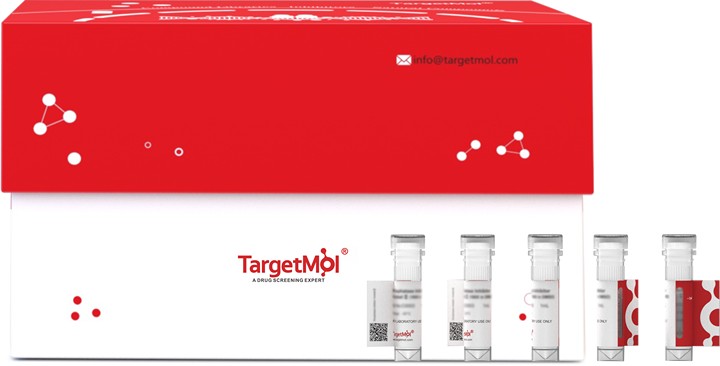- Remove All
 Your shopping cart is currently empty
Your shopping cart is currently empty
MELK Protein, Human, Recombinant (His & Myc)
Serine/threonine-protein kinase involved in various processes such as cell cycle regulation, self-renewal of stem cells, apoptosis and splicing regulation. Has a broad substrate specificity; phosphorylates BCL2L14, CDC25B, MAP3K5/ASK1 and ZNF622. Acts as an activator of apoptosis by phosphorylating and activating MAP3K5/ASK1. Acts as a regulator of cell cycle, notably by mediating phosphorylation of CDC25B, promoting localization of CDC25B to the centrosome and the spindle poles during mitosis. Plays a key role in cell proliferation and carcinogenesis. Required for proliferation of embryonic and postnatal multipotent neural progenitors. Phosphorylates and inhibits BCL2L14, possibly leading to affect mammary carcinogenesis by mediating inhibition of the pro-apoptotic function of BCL2L14. Also involved in the inhibition of spliceosome assembly during mitosis by phosphorylating ZNF622, thereby contributing to its redirection to the nucleus. May also play a role in primitive hematopoiesis.

MELK Protein, Human, Recombinant (His & Myc)
| Pack Size | Price | Availability | Quantity |
|---|---|---|---|
| 20 μg | $284 | 20 days | |
| 100 μg | $590 | 20 days | |
| 1 mg | $2,530 | 20 days |
Product Information
| Biological Activity | Activity has not been tested. It is theoretically active, but we cannot guarantee it. If you require protein activity, we recommend choosing the eukaryotic expression version first. |
| Description | Serine/threonine-protein kinase involved in various processes such as cell cycle regulation, self-renewal of stem cells, apoptosis and splicing regulation. Has a broad substrate specificity; phosphorylates BCL2L14, CDC25B, MAP3K5/ASK1 and ZNF622. Acts as an activator of apoptosis by phosphorylating and activating MAP3K5/ASK1. Acts as a regulator of cell cycle, notably by mediating phosphorylation of CDC25B, promoting localization of CDC25B to the centrosome and the spindle poles during mitosis. Plays a key role in cell proliferation and carcinogenesis. Required for proliferation of embryonic and postnatal multipotent neural progenitors. Phosphorylates and inhibits BCL2L14, possibly leading to affect mammary carcinogenesis by mediating inhibition of the pro-apoptotic function of BCL2L14. Also involved in the inhibition of spliceosome assembly during mitosis by phosphorylating ZNF622, thereby contributing to its redirection to the nucleus. May also play a role in primitive hematopoiesis. |
| Species | Human |
| Expression System | E. coli |
| Tag | N-10xHis, C-Myc |
| Accession Number | Q14680 |
| Amino Acid | MKDYDELLKYYELHETIGTGGFAKVKLACHILTGEMVAIKIMDKNTLGSDLPRIKTEIEALKNLRHQHICQLYHVLETANKIFMVLEYCPGGELFDYIISQDRLSEEETRVVFRQIVSAVAYVHSQGYAHRDLKPENLLFDEYHKLKLIDFGLCAKPKGNKDYHLQTCCGSLAYAAPELIQGKSYLGSEADVWSMGILLYVLMCGFLPFDDDNVMALYKKIMRGKYDVPKWLSPSSILLLQQMLQVDPKKRISMKNLLNHPWIMQDYNYPVEWQSKNPFIHLDDDCVTELSVHHRNNRQTMEDLISLWQYDHLTATYLLLLAKKARGKPVRLRLSSFSCG |
| Construction | 1-340 aa |
| Protein Purity | > 85% as determined by SDS-PAGE. |
| Molecular Weight | 44.3 kDa (predicted) |
| Endotoxin | < 1.0 EU/μg of the protein as determined by the LAL method. |
| Formulation | If the delivery form is liquid, the default storage buffer is Tris/PBS-based buffer, 5%-50% glycerol. If the delivery form is lyophilized powder, the buffer before lyophilization is Tris/PBS-based buffer, 6% Trehalose, pH 8.0. |
| Reconstitution | Reconstitute the lyophilized protein in sterile deionized water. The product concentration should not be less than 100 μg/mL. Before opening, centrifuge the tube to collect powder at the bottom. After adding the reconstitution buffer, avoid vortexing or pipetting for mixing. |
| Stability & Storage | Lyophilized powders can be stably stored for over 12 months, while liquid products can be stored for 6-12 months at -80°C. For reconstituted protein solutions, the solution can be stored at -20°C to -80°C for at least 3 months. Please avoid multiple freeze-thaw cycles and store products in aliquots. |
| Shipping | In general, Lyophilized powders are shipping with blue ice. Solutions are shipping with dry ice. |
| Research Background | Serine/threonine-protein kinase involved in various processes such as cell cycle regulation, self-renewal of stem cells, apoptosis and splicing regulation. Has a broad substrate specificity; phosphorylates BCL2L14, CDC25B, MAP3K5/ASK1 and ZNF622. Acts as an activator of apoptosis by phosphorylating and activating MAP3K5/ASK1. Acts as a regulator of cell cycle, notably by mediating phosphorylation of CDC25B, promoting localization of CDC25B to the centrosome and the spindle poles during mitosis. Plays a key role in cell proliferation and carcinogenesis. Required for proliferation of embryonic and postnatal multipotent neural progenitors. Phosphorylates and inhibits BCL2L14, possibly leading to affect mammary carcinogenesis by mediating inhibition of the pro-apoptotic function of BCL2L14. Also involved in the inhibition of spliceosome assembly during mitosis by phosphorylating ZNF622, thereby contributing to its redirection to the nucleus. May also play a role in primitive hematopoiesis. |
Dose Conversion
Calculator
Tech Support
Keywords

Copyright © 2015-2025 TargetMol Chemicals Inc. All Rights Reserved.


